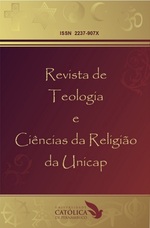RAZÕES DO ESTADO IMPERIAL PARA A CRIAÇÃO DO CURSO JURÍDICO EM PERNAMBUCO
DOI:
https://doi.org/10.25247/paralellus.2023.v14n35.p721-749Palavras-chave:
Império, Pernambuco, DireitoResumo
Este trabalho tem como proposta discorrer sobre o as razões que levaram o Estado
Imperial brasileiro a criação do curso jurídico em Pernambuco, bem como sobre os
aspectos que fizeram da faculdade de Direito do Recife, um dos centros mais
importantes do saber, da história moderna e contemporânea do Brasil. Para tal
buscamos nas estruturas, políticas do Estado Imperial brasileiro, os elementos para a
criação do curso jurídico em Pernambuco. Realizou-se um resgate historiográfico em
jornais e livros, da evolução do pensamento jurídico da época, que fora fomentado,
em terras pernambucanas, realizando um levantamento das propostas de criação dos
cursos jurídicos no Brasil, bem como da lei de 11/08/1827, que cria os cursos jurídicos
no Brasil. O período de estudo desta pesquisa prende-se aos anos de 1822 a 1870,
muito embora tenha-se que utilizar do diacronismo, para estabelecermos uma lógica
temporal, para a estrutura de entendimento dos fatos, que marcaram essa nova etapa
do saber nacional. A educação no Brasil até a chegada da família real em 1808
resumia-se as experiências jesuíticas da Companhia de Jesus. Com o advento da
independência do Brasil em 1822, passou a circular no Brasil, as ideias sobre um
sistema de educação próprio. Esse sistema de educação que outrora só seria
destinado aos súditos da coroa, ganhou defensores para sua generalização, como um
direito de todo cidadão da nova nação. Pernambuco constituía possivelmente no
maior foco do liberalismo no país, o que contradizia-se com o absolutismo de Dom
Pedro I, as ideologias que chegam a todo momento da Europa e dos Estados Unidos,
faziam suscitar o caráter aguerrido e rebelde de uma das províncias mais importantes
do Estado brasileiro. A escolha pela cidade de São Paulo nos parece óbvia, o já
destacado porto de Santos, a proximidade das instalações da coroa e a já incipiente
infraestrutura, a província representava a organização da política e da atividade
econômica, os interesses de desenvolvimento da pátria favoreciam a cidade. Mas a
escolha de Olinda remonta ainda ao ano de 1800, quando Azeredo Coutinho bispo de
Olinda e governador interino de Pernambuco, fundou um seminário modelar. Esse
instituto inaugurado em 22/02/1800 abrigaria em 1827 a então faculdade jurídica.
Pernambuco era o principal representante das ideias liberais, já havia se sublevado e
persuadido outras províncias de fazem o mesmo. A escolha de Pernambuco como
sede de uma das faculdades afigura-se até o momento desta pesquisa, como uma
escolha estratégica de vigilância pronta para punição. Dom Pedro I, que já havia
punido a província pernambucana, com desligamento do extenso território da
Comarca do São Francisco, teria a faculdade como os olhos da coroa a vigia a
província rebelde. Após a transferência da faculdade de Olinda para Recife, foi
possível constatar uma produção literária, que se não mudaria o panorama
educacional do Estado, levaria a profundas discussões sobre o mesmo. Esse sistema
de educacional que outrora só seria destinado aos súditos da coroa, ganhou não só
defensores para sua popularização, como foi incorporado, a ordem dos novos
estudos, entre eles a do direito criminal tão estagnado. Pernambuco constituía
possivelmente no maior foco do liberalismo no país, mas também havia de ser o berço
de uma retórica que buscaria através das palavras sua arma, para tentar vencer o
direito reprodutor de leis.
Downloads
Referências
ADORNO, Sergio. Os aprendizes do poder: bacharelismo liberal na política brasileira.
São Paulo: Paz e Terra, 1988
AQUINO, Rubim Leão de; MENDES, Francisco Roberval; BOUCINHAS, André Dutra.
Pernambuco em chamas: revoltas e revoluções em Pernambuco. Recife. Fundação
Joaquim Nabuco. Massangana. 2009.
BEVILAQUA, Clovis. História da Faculdade de Direito do Recife. Instituto Nacional
do Livro com a colaboração do Conselho Federal de Cultura- Ministério da
Educação. 2ª Ed. 1977.
CARRION, Maria da Conceição de Araújo. Universidade e poder: a formação dos
cursos jurídicos no Brasil. Professora de história da educação da UFRGS. – Biblos,
Rio Grande, 7:149-153, 995
DEIRÓ, Pedro Eunápio da Silva. Fragmentos de estudos da história da Assembleia.
Brasília: Senado Federal, Conselho Editorial, 2006.364 p. -- (Edições do Senado
Federal; v. 66).
FERRONATO, Cristiano de Jesus. Construindo uma nova ordem: o debate
educacional na Assembléia Constituinte de 1823/ Cristiano de Jesus Ferronato.- João
Pessoa, 2006. 168p. UFPB/BC
HOBBES, Thomas. Leviatã. 2ª Ed. São Paulo: Martin Claret, 2012. Parte II, cap. XVII.
LIMA, Oliveira Manuel de. Pernambuco e seu desenvolvimento. Coleção
pernambucana. 2ªed. Recife, 1975. Companhia editora de Pernambuco.
LOPES, José Reinaldo de Lima. O Direito na História: Lições introdutórias. São Paulo,
Max Limonad, 2000.
SANTOS, Daniella Miranda; CASIMIRO, Ana Palmira Bittencourt Santos Revista
Thesis Juris – São Paulo, .2, N.1, pp. 258-287, Jan./junho.2013
Schwarez, Lilia Moritiz. O espetáculo das raças: cientistas, instituições e questão
racial no Brasil- 1870-1930. São Paulo. Companhia das letras. 1993.
VENÂNCIO FILHO, Alberto. Das arcadas ao bacharelismo: 150 anos de ensino
jurídico no Brasil. São Paulo: Perspectiva, 2004.
WOLKMER, Antônio Carlos. Fundamentos de História do direito. BH, Delrey, 1996.
Downloads
Publicado
Edição
Seção
Licença
Copyright (c) 2024 Edjaelson Pedro Silva, Christiane Teixeira Gomes

Este trabalho está licenciado sob uma licença Creative Commons Attribution 4.0 International License.
A submissão de originais para a Paralellus implica a transferência, pelos autores, dos direitos de publicação eletrônica. Os direitos autorais para os artigos veiculados neste periódico são do autor; todavia, são da revista os direitos sobre a primeira publicação. Os autores somente poderão fazer uso dos mesmos resultados em outras publicações se indicarem, claramente, que a Paralellus foi o meio originalmente utilizado. Em decorrência do fato de ser a Paralellus uma revista de acesso público, é permitida a utilização gratuita dos artigos em aplicações educacionais e/ou científicas não comerciais, desde que respeitando-se a exigência de citação da fonte (Texto atualizado em 16-11-2020).



















